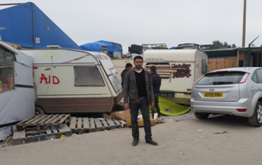 Having read about and witnessed scenes on television of the humanitarian disaster affecting refugees across Europe, I developed a desire to help in some form.
Having read about and witnessed scenes on television of the humanitarian disaster affecting refugees across Europe, I developed a desire to help in some form.
In February 2016, the United Nations Refugee Agency stated that “It is concerned about some 4000 refugees and migrants currently reported to be living in the Calais ‘jungle’ and almost 2500 in Grande-Synthe, on the edges of Dunkerque, often in dire circumstances, aggravated by the winter conditions. Of particular concern are hundreds of children, many of them travelling by themselves, who arrive at the informal camps in northern France in need of both shelter and adequate protection.”
When I came across a volunteering group called “Refugee Support First Aid & Care Team“—not an organisation but a group of volunteers, with aims similar to mine—I decided that I wanted to volunteer in Calais with them.
Along with a colleague Nazam Guffoor, who works with patients with learning difficulties, I made my way to Calais for the second May bank holiday period. After having dealt with a few red tape issues in Calais, the true horror of the situation became apparent when we entered the camp.
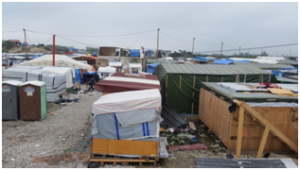 I saw children and adults walking with clearly inadequate shoes. Tents and structures put up for accommodation and various other uses, which had been battered by the elements. Outdoor washing areas and portaloos where hygiene and sanitation standards could be described as minimum to say the least. A couple of female volunteers informed me that they were avoiding drinking anything to avoid having to use these poorly managed toilets.
I saw children and adults walking with clearly inadequate shoes. Tents and structures put up for accommodation and various other uses, which had been battered by the elements. Outdoor washing areas and portaloos where hygiene and sanitation standards could be described as minimum to say the least. A couple of female volunteers informed me that they were avoiding drinking anything to avoid having to use these poorly managed toilets.
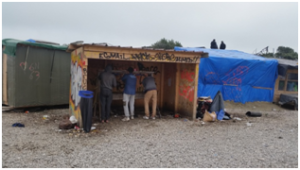 I could quickly perceive that this was an area of devastation with a complete failure of humanity. The simmering tension there was almost tangible following a camp fire and rival group fighting on the previous day, which had led to charity workers, migrants, and police all being injured.
I could quickly perceive that this was an area of devastation with a complete failure of humanity. The simmering tension there was almost tangible following a camp fire and rival group fighting on the previous day, which had led to charity workers, migrants, and police all being injured.
The camp had a few roads, and these were made of stones and gravel. On one corner my car got stuck in the deep gravel and mud.
The sound of a stuck car and one full of goods drew unwanted attention, which I had been trying to avoid, and a large crowd. However, within seconds the crowd took it upon themselves to push my car out of the ditch to a place of safety. We had come to help these people in difficulty, and how the roles had been reversed.
Medical camp
After my car trouble, we reached the Refugee Support First Aid & Care Team’s medical camp that consisted of three caravans. Present were two translators and a variety of amazing volunteers who I had the pleasure to work alongside over the next couple of days. There was a retired GP, an A&E SHO, a psychologist, and a wonderful podiatry team—who taught me a lot of dressing and strapping techniques over the course of our work together. It turned out to be an amazing multidisciplinary team.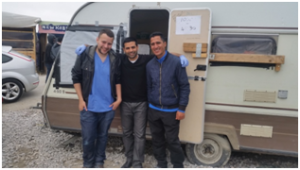
I saw a range of patients and treated them in a fast turnover time. All of the patients waited for their turn without a single moan, contrasting with the usual hospital headaches one can face. While managing the patients I heard a lot of incredible stories of what the refugees had faced in their lives. They had come from across the world including Afghanistan, Eritrea, Iran, Iraq, Pakistan, Syria, and Sudan.
Patients and management
I encountered lots of coughs and chest infections consistent with sleeping in the outside cold. I treated wounds, abrasions, conjunctivitis, eye problems due to police CS gas spray, baton injuries, muscle sprains, head and ear aches, and I saw a few pregnant women. A few abscesses were drained, I carried out basic treatment of fractures with bandaging and strapping, and I referred those who required more specialist management to the local hospital, Jules Ferry “Salam” centre, which would be accessible after the weekend. This included a patient with possible TB or malaria. Other patients seen included those with tonsillitis, skin ulcers, dental problems, burns, fungal toe infections, allergies, hay fever, and gastric reflux issues. Normally, the medical camp would run until sunset, but because of the recent fighting it was agreed that the camp would close at around 5pm.
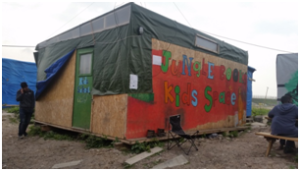 When it was time to leave I felt that I’d gained a unique experience, which has given me a different perspective on dealing with some of the daily problems I can encounter in the NHS day job. As, sadly, no end seems in sight I plan to return to the camp.
When it was time to leave I felt that I’d gained a unique experience, which has given me a different perspective on dealing with some of the daily problems I can encounter in the NHS day job. As, sadly, no end seems in sight I plan to return to the camp.
The following are a few organisations or groups that may interest those who wish to volunteer in some capacity.
Refugee Support First Aid & Care
The Caravans for Calais Project
Convoy to Calais—Stand up to racism: Saturday 18 June
Goher Rahbour is a general surgery registrar ST5 on a North West London general surgery training rotation.
Competing interests: None declared.
